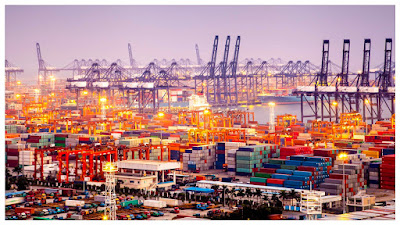Daniel Anowu writes: With 4.4 million coronavirus cases and 296,101 deaths globally, the world lingers in battling the coronavirus pandemic. Before the occurrence, the perspective for the world economy and especially developing African countries like Nigeria were fragile, as global GDP growth was estimated to be only 2.5 percent in 2020. While many developing countries have recorded comparatively fewer cases, Nigeria currently has over 4,787 confirmed cases and 158 deaths as 13th May 2020 confirmed by the NCDC. The weak capacity of health care systems in the country is likely to aggravate the pandemic and its impact on the Nigerian economy.
THE EFFECT OF COVID-19 ON THE NIGERIAN ECONOMY
Afore the pandemic, the Nigerian government had been struggling with weak recovery from the 2014 oil price shock, with GDP growth conical around 2.3 percent in 2019. In February, the IMF revised the 2020 GDP growth rate from 2.5 percent to 2 percent, as a result of relatively low oil prices and limited fiscal space. Relatedly, the country’s debt profile has been a source of concern for policymakers and development practitioners as the most recent estimate puts the debt service-to-revenue ratio at 60 percent, which is likely to worsen amid the steep decline in revenue associated with falling oil prices. These constraining factors will aggravate the economic impact of the COVID-19 outbreak and make it more difficult for the government to weather the crisis.
No economy is spared from the fall-out from COVID-19 outbreak. Meanwhile, oil prices have dipped to historical lows, and its support levels are noticeably not in sight as it clipped US$20pb on 30thof March, 2020. Oil production has outpaced demand due to the impasse between OPEC and OPEC +(Russia) in a bid to rein in threats from the surge in the US on oil production also, worse events still ahead as demand may dip further in half-year 2020 and beyond, if factories and airlines remain closed, even as movement of people and goods within and between countries are largely restricted.
The resulting effect of this is that Aggregate demand will fall, but government expenditure will rise. Currently, efforts were already being made to bolster aggregate demand through increased government spending and tax cuts for businesses. The public budget increased from 8.83 trillion naira ($24.53 billion) in 2019 to 10.59 trillion naira ($29.42 billion) in 2020, representing 11 percent of the national GDP, while small businesses have been exempted from company income tax, and the tax rate for medium-sized businesses has been revised downwards from 30 to 20 percent. Unfortunately, the COVID-19 crisis is causing all components of aggregate demand, except for government purchases, to fall.
COVID-19 pandemic affects the components of aggregate demand with the following:
Falling consumption pattern
Falling Investments
Upsurge Government spending
Decreasing Net Exports
The fall in household consumption in Nigeria will stem from;
1) Partial (or full) restrictions on movement, thus causing consumers to spend primarily on essential goods and services.
2) Low potentials of future income, particularly by workers in the gig economy that are engaged on a short-term/contract basis, as well as the working poor in the informal economy.
3) The destruction of wealth and expected wealth as a result of the decline in assets such as stocks and home equity. Movement restrictions have not only reduced the consumption of nonessential commodities in general, but have affected the income-generating capacity of these groups, thus reducing their consumption expenditure.
FISCAL POLICY RESPONSES BY THE NIGERIAN GOVERNMENT
Fiscal policy refers to the use of government spending and tax policies to influence economic conditions. In relation to COVID-19, the federal government of Nigeria has put in place the following policies
Expansionary Fiscal Policy
During a recession, the government may employ expansionary fiscal policy by lowering tax rates to increase aggregate demand and fuel economic growth. The Central Bank of Nigeria (CBN) has arranged a fiscal stimulus package, including a 50 billion naira ($138.89 million) credit facility to households and small and medium enterprises most affected by the pandemic, a 100 billion naira ($277.78 million) loan to the health sector, and a 1 trillion naira ($2.78 billion) to the manufacturing sector. In addition, the interest rates on all CBN interventions have been revised downwards from 9 to 5 percent, and a one-year moratorium on CBN intervention facilities has been introduced, effective March 1.
With oil being Nigeria’s main source of foreign exchange, amid the steep decline in oil prices, the official exchange rate has been adjusted from 306 to 360 naira. The exchange rate under the investors and exporters (I&E) window has also been adjusted from 360 to 380 naira in order to unify the exchange rates across the I&E window, Bureau de Change, and retail and wholesale windows. Furthermore, the government has introduced import duty waivers for pharmaceutical companies and increased efforts toward ensuring that they receive forex.
Other Suggested Policy Responses That Can Be Implemented As Suggested By Experts
Given the size and scope of the economic impact of the pandemic, there is the need to implement other recovery strategies to stimulate demand.
The federal government should improve efforts towards enhancing the efficiency and effectiveness of the distributive mechanisms to reach households that are worst-hit by the pandemic.
The Federal Inland Revenue Service (FIRS) as well as State Inland Revenue Services (SIRS) should waive payments on personal and corporate income tax for the second quarter of 2020, considering that the shock has affected the income and profits of households and businesses.
The CBN’s decision to increase the cash reserve ratio (CRR) from 22.5 percent to 27.5 percent in January 2020 should be revisited to provide liquidity for banks so that banks can, in turn, create credit to the private sector.
FIRS and SIRS should delay tax collection for the worse-hit sectors including tourism, the airline industry, and hoteliers in order to enable them recover from the steep decline in demand.
The COVID-19 pandemic is a wake-up call to policymakers as the unusual and unprecedented nature of the crisis has made it impossible for citizens to rely on foreign health care services and more difficult to solicit for international support given the competing demand for medical supplies and equipment. A more integrated response spanning several sectors—including the health, finance, and trade sectors—is required to address structural issues that make the country less resilient to shocks and limit its range of policy responses. In the long term, tougher decisions need to be made, including but not limited to diversifying the country’s revenue base away from oil exports and improving investments in the health care sector in ensuring that the economy is able to recover quickly from difficult conditions in the future.
Written By: Daniel Anowu






















0 comments:
Post a Comment